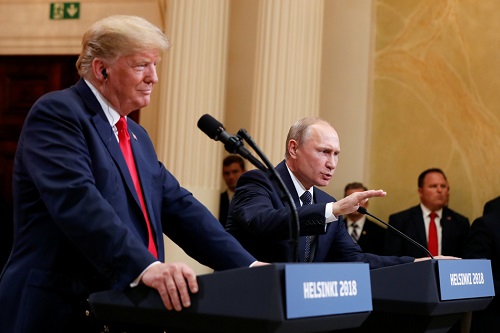Reuters photo
By
Elena Alekseenkova
The NATO Summit, held on July 11–12, 2018, gave Brussels and the EU countries good reason to fear any decisive steps that Donald Trump might take with regard to Moscow. There were even suggestions that the unrelentingly tense atmosphere between the NATO partners might lead Trump to sweep a metaphorical curtsey before Vladimir Putin by recognizing Crimea as a part of Russia or agreeing the relax sanctions against the country. In the end, nothing that extreme happened, although the meeting between the two presidents did cause considerable concern in Brussels and European capitals.
The meeting between Donald Trump and Vladimir Putin received various assessments across the European Union, although the main conclusion was generally the same: it went better than the recent NATO Summit, which Der Spiegel poked fun at rather emphatically. Particularly insulting for Brussels was the fact that the European Union had recently found itself among the trade “enemies” of the United States, while, at the meeting with Putin, Trump had nothing negative to say about Moscow. On the contrary, he recognized Russia as a “competitor,” which the Russian leadership must have found quite flattering indeed. The European press jumped all over this. The overall sentiment among European commentators was that Trump is playing into the hands of Putin, who seeks to split the European Union, while a level of trust is emerging between the two leaders that has long ceased to exist among the NATO countries.
However, putting all emotions aside, let us attempt to see whether it is worth worrying about the European Union. And if so, why exactly?
First. Both the United States and the European Union are equally convinced of Russia’s interference in the U.S. elections, and the European affairs and are therefore interested in obtaining guarantees from Russia that it will not interfere in the future. The United States and Brussels agreed on this issue before the meeting, which is why the European side was not pleased with the manner in which it was addressed (although they were not as disgruntled as the American establishment and intelligence services). Not only did Trump fail to chastise Putin, but he also demonstrated a lack of confidence in his own intelligence services – although his did hasten to fix this after the meeting. As far as the European Union is concerned, the meeting proved above all that the EU does not have a serious ally in the President of the United States when it comes to keeping Russia from interfering in the domestic affairs of EU countries. However, finding such an ally inside Congress, among part of the American establishment, or even in the form of a new president should not present any serious difficulties, so all the European Union has to do is wait a few years for the situation to correct itself.
Second. The President of the United States did not utter a single word about Ukraine during the meeting (not during the bit we saw, at least). This was another serious blow for the European Union, and for Berlin in particular. This silence on an issue that the European Union sees as the key reason for the conflict between Russia and the collective West means, first of all, that the United States has lost interest in the Ukrainian issue and does not see it as worthy of attention, and second, that it is ready to cooperate in other areas while this key issue is pushed into the background. Discussing other issues while ignoring the main one could be seen as the United States making a concession to Russia. In this context, there is a feeling inside the European Union that the organization is the last beacon of democracy and liberal values in the world, as its main partner has shown that it is prepared to make compromises independently without developing a coordinated approach with the European Union or reaching prior agreement with it.
Third. The meeting did not clarify the situation surrounding Nord Stream 2, which remains rather fuzzy for Brussels and Berlin. On the one hand, it was reiterated that Germany was well within its rights to settle this issue independently, and that the United States would compete with Russia for the European gas market. The use of business terminology would seemingly imply that the game will be conducted according to the rules of healthy competition; however, previous statements by Trump that Germany could become “hostage” to Russia suggest that the President of the United States does not, and will not, shy away from politicizing the matter. The European Union is well aware that, when it comes to European energy security, Russia has long since proven itself to be a reliable supplier and partner, and that the recent actions of the United States with regard to trade and economic relations with the European Union, China, and other partners force the EU to question the ability and willingness of the United States to honour their agreements. It is also likely that Washington will continue to use the “security trump card” as an instrument of pressure in economic issues – it is not for nothing that Trump claims that the United States provides 91 per cent of the financing of European security. Therefore, regardless of whether or not the Russian side promises gas transit via Ukraine, the problem of security in exchange for access to the gas market will remain.
Fourth. Trump did not mention anything during the meeting about easing sanctions against Russia. We can thus conclude that the European Union’s fears were unjustified in this instance. However, there is a feeling inside the European Union than the United States and Russia can restore confidence between the two countries, something that is looking increasingly unlikely for US–EU relations. At the very least, there were far more positives to be taken from the meeting between Trump and Putin than from the recent NATO Summit. A number of European media outlets noted that Trump treated Putin as his equal, which would suggest that the policy of isolating Russia, an approach that the European Union had been counting on since it introduced sanctions in 2014, has effectively failed.
Fifth. Brussels senses a weakening of solidarity within the European Union regarding relations with Russia and a willingness of a number of its member countries to establish a dialogue with Moscow. This is why there are growing fears inside the European Union that Donald Trump’s pragmatic approach of cooperation with Russia will further strengthen the position of those in EU member states who criticize Brussels. This is all the more true given that the approach of “selective engagement” with Russia proposed by High Representative of the European Union for Foreign Affairs and Security Policy Federica Mogherini has not yielded any tangible results so far, while the United States and Russia, given sufficient political will, could actually achieve something.
While the European Union’s fears about the meeting between Donald Trump and Vladimir Putin did not pan out and no concrete concessions were made on either side, and the results of the meeting are already being devalued by the attitude towards the meeting within the United States itself, Brussels and Berlin still see the event as yet another step by US and Russian leaders towards undermining European and Euro-Atlantic solidarity. At the same time, a number of EU countries have welcomed the new “thaw” in relations between Moscow and Washington. For example, Minister of the Interior of Italy Matteo Salvini has said that he would be happy to hold the next meeting of the two presidents on Italian soil. Whether or not the Italian side will be able to convert the trust between Moscow and Rome into greater mutual confidence between the presidents of Russia and the United States without destroying European solidarity depends on two unknowns: 1) the level of mutual trust between Donald Trump and Vladimir Putin, and 2) the strength of European solidarity.
This article was originally published by the RIAC and is reproduced with their kind permission
Elena Alekseenkova
PhD in Political Science, RIAC Program Manager, Research Fellow at Centre for Global Problems Studies, MGIMO-University.



No Comments Yet!
You can be first to comment this post!